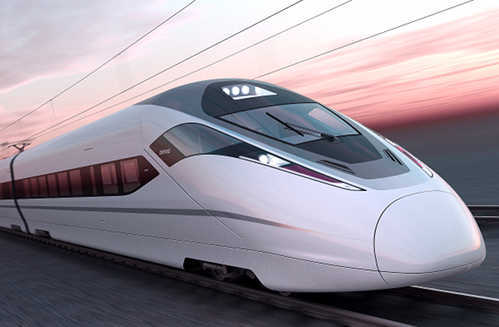We should not lose our nerve on HS2
28 August 2013
Major transport infrastructure projects have a nasty habit of frightening people and stirring up public opposition and anxiety, says GEOFF DOSSETTER. The debate about such schemes tends to revolve around, and concentrate on, the costs and the problems, rather than the potential payback and the practical benefits.

All major infrastructure projects, transport or otherwise, demand the ability to ‘think big’. How else would the Victorians have ever set about, financed and constructed the national rail network or the sewage system? How would we have built the Forth Bridge or the London Underground or the tunnels under the Thames? How would we have developed the motorway network? Or the Channel Tunnel? Or Heathrow? How would be have built our cathedral like rail terminals?
I could go on but perhaps you take the point. To undertake such expensive, ambitious and large scale developments, which cost eye watering amounts of money and alter our landscape and people’s lives, you need to ‘go boldly’. You need to ‘think big’.
Big transport undertakings are in the news at present. We are about to see the opening of London Gateway, a massive port development. We are also building Crossrail in London. We are trying to decide what to do about airport capacity in the south east – Heathrow or elsewhere. And, years after many of our world economic competitors have got on with it, we are contemplating the construction of a high speed rail system – HS2. Only now we seem to be thinking twice about it.
Despite the cost and the disruption of such an ambitious undertaking, the Government remains fully committed to the scheme, as was its predecessor. In a nutshell the idea is that, by moving trains over long distances at great speed, the scheme will not only benefit its actual users, who will get where they are going rather more quickly, but will also significantly increase the overall capacity of the existing rail network and its ability to move the ever increasing numbers of passengers and consignors of freight who want to use it.
Meanwhile, a disturbingly growing number of detractors say that the estimated cost of construction of HS2 is too high and that the money would be better spent on a variety of other transport projects – perhaps filling potholes, building bypasses, jam busting measures, lengthening rail platforms and so on.
Some of these second thoughts and doubts are a little puzzling coming, as they have done, from groups we might have expected to show nothing but absolute support. For as long as I can remember the representatives of UK industry have called for more spending on the UK’s transport infrastructure. Nothing has value until it is delivered to its customer, so the ability to deliver goods as quickly, conveniently and as cheaply as possible, is absolutely vital. Road congestion is a waste of money and man hours. If they possibly can, manufacturers, retailers and distributors would far rather trunk their bulk goods by rail than have them sitting around in rush hour road traffic queues.
And the public demand for increased rail passenger services is self evident to anybody who has been on a train in recent years. In fact rail passenger levels have doubled over the last 20 years to numbers not seen for almost a century. The convenience of the train, as opposed to the sometimes inconvenience of traffic and parking for people and, worse still, delivery hassles for road freight, are obvious.
And, of course, we are constantly reminded of the current and future growth in our population. We are going to see millions more of us in future years as we live longer, stay mobile and immigration levels continue. For the benefit of society and for the benefit of the economy, sheer common sense demands that we must find improved ways of moving both people and the food and goods needed to sustain them. Which clearly means creating more transport capacity, including rail capacity.
Its critics suggest that the costs of HS2 may be under estimated. My guess is that so are the benefits. As it stands at present, if we do not build HS2 then we will undoubtedly have to build some other rail system anyway in order to satisfy our growing demands. As such, it seems to me that we might just as well get on with building the most efficient and modern system available to us.
And that means high speed rail. HS2. Let’s get on with it.
- A parcel of profits!
- Putting their feet up
- Safer logistics campaign - Tackling sleep apnoea
- Tackling sleep apnoea
- Giving green a lift
- Management urged to pay heed to driver CPC training deadline
- We need to know the truth on fuel price fixing
- A parcel of profits!
- Deadline fast approaching
- Transport Manager - a title to be proud of
- No related articles listed










/GRABOMATIC LOGO-tn.jpg)
















